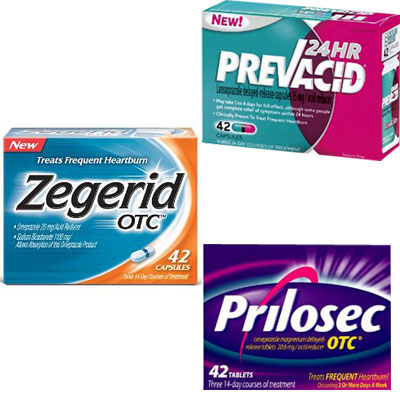The purple pill, the medicine that you can buy over-the-counter for GERD, heartburn, or acid indigestion. But these drugs are not benign, and you should think twice before buying these on a regular basis. The drugs are called proton pump inhibitors, because they interrupt a pathway to acid production in the stomach. Here is the list of them:
- omeprazole (Prilosec, Prilosec OTC)
- lansoprazole (Prevacid, Prevacid 24-Hour
- dexlansoprazole (Dexilent, Kapidex)
- rabeprazole (Aciphex)
- pantoprazole (Protonix)
- esomeprazole (Nexium)
- Zegarid, a rapid release form of omeprazole.
The drugs are powerful, but they should not be used for more than 14 days at a time, and they are not good for acute heartburn. For that you should use other drugs, like Tums.
Between the ones you can buy over-the-counter and prescriptions they account for 13 billion dollars in sales a year. They are the ninth most prescribed drug group in the United States – and probably one of the most dangerous and least necessary.
These drugs not only turn off the acid production of the stomach, but also turn off the acid production in other cells. This may be responsible for the increased risk of dementia – because those damaged cells in the brain cannot be removed. It may be partially responsible for the increased risk of infections – the inability of the immune system to destroy bacteria by oxidation.
From: U.S. Food and Drug Administration (FDA).
- Be aware that an increased risk of fractures of the hip, wrist, and spine has been reported in some studies of patients using proton pump inhibitors. The greatest increased risk for these fractures was seen in patients who receive high doses of these medications or use them longer (a year or more).
- Be aware that the OTC proton pump inhibitors should only be used as directed for 14 days for the treatment of frequent heartburn. If your heartburn continues, talk to your healthcare professional. No more than three 14-day treatment courses should be used in one year.
New Dangers from Proton Pump Inhibitors include:
- Increased risk of infection from food borne illness. Because the stomach acid is inhibited the risk of food poisoning is higher.
- Increased risk of hospital acquired diarrhea. From the bacteria C. difficile, the danger is so high that Dr. Michael Goldfarb forbade patients who took this drug from being on the surgical floor at Monmouth Hospital in New Jersey.
- Lower blood magnesium levels that cause increased muscle spasms, heart palpitations, convulsions, and fractures of the hip, wrist, or spine.
- Increased risk of chronic kidney disease. The risk of developing kidney disease by being on this drug increased by 50%. Over ten years people who took these drugs had a 12% risk of developing chronic kidney disease.
- Increased risk of dementia. Those who took these medications had a 13% risk of developing dementia over seven years of the study, while those who did not have an 8% risk (five per cent difference).
- A higher risk of heart attacks.
- While proton pump inhibitors were thought to decrease the risk of developing esophageal cancer for those at risk (with Barrett’s disease of the esophagus) it turned out that people who took these drugs were at increased risk for developing esophageal cancer.
Alternatives to Proton Pump Inhibitors
- Tagamet (cimetidine) , Zantac (ranitidine), and Pepcid (famotidine) are a class called H2 receptor blockers and do not have the same issues.
- Antacids such as Maalox and Mylanta.
- Lifestyle changes are the best – weight loss, dietary changes.
- If you have severe problems a surgical solution called a Hiatal Hernia Repair may be in order (one of the more common surgical procedures I do in my practice).
I have had mild reflux for years and have never taken a proton pump inhibitor. On occasion I will take some Pepcid Complete (a combination of Pepcid and Tums) but mostly my lifestyle change includes not eating late at night, light dinners, and weight loss.

